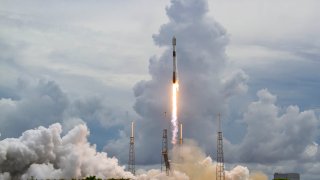
- SpaceX is raising prices across its products and services, including for rocket launches and Starlink satellite internet, citing "excessive levels of inflation."
- The price hikes range from as much as a 20% increase for new Starlink hardware, to 8% for launches with the company's Falcon 9 and Falcon Heavy rockets.
- "It's a tough challenge, keeping ahead, just so we don't start bleeding," SpaceX Vice President of Commercial Sales Tom Ochinero told CNBC.

WASHINGTON — SpaceX is raising prices across its products and services, including for rocket launches and Starlink satellite internet, citing "excessive levels of inflation."
The double-digit price hikes come shortly after SpaceX CEO Elon Musk tweeted that both the space company and automaker Tesla have been "seeing significant recent inflation pressure in raw materials & logistics."
SpaceX sent notices on Tuesday to Starlink users and deposit holders noting the higher prices, according to a copy of the email obtained by CNBC.
"The sole purpose of these adjustments is to keep pace with rising inflation," the Starlink email said.
Money Report
Starlink's baseline monthly service price will increase by 11%, to $110 from $99 per month, effective May 21. The price of the baseline Starlink hardware will jump by 10%, to $549 from $499, for users who placed a deposit but are on SpaceX's waiting list for service.
For new orders, the company increased the base hardware price by 20%, to $599 from $499.
Users seeking a refund in light of the price changes can cancel service without a fee, but will only receive a full refund if they received the Starlink hardware in the past 30 days. Otherwise, SpaceX is offering a partial refund of $200 for users who cancel within the first year of service.
SpaceX did not change the pricing of its premium service, rolled out in February, but did recently rebrand the offering as Starlink Business, according to its website. Starlink Business requires a $500 refundable deposit and a $2,500 fee for the hardware and comes with a $500-per-month service cost.
Rocket prices rise
SpaceX also raised prices across its launch business, with increases affecting everything from wholesale rocket purchases to small satellites hitching a ride to orbit.
SpaceX Vice President of Commercial Sales Tom Ochinero told CNBC the price increases were "purely an inflation-driven decision."
"It's long overdue and it's just the cost of everything. I don't even think that covers the cost of everything we're experiencing, everything from helium to gas to my humans — you got to pay people so much now, it's such a competitive market," Ochinero said from the Satellite 2022 conference in Washington, D.C.
The starting prices for a Falcon 9 or Falcon Heavy rocket will each increase by about 8%. A Falcon 9 launch will cost $67 million, up from $62 million, and a Falcon Heavy launch will now run $97 million, up from $90 million.
A footnote on SpaceX's pricing page notes that "missions purchased in 2022 but flown beyond 2023 may be subject to additional adjustments due to inflation."
"It's a tough challenge, keeping ahead, just so we don't start bleeding," Ochinero added.
The company also adjusted its prices for its small satellite rideshare program. Those flights will now start at $1.1 million to fly a payload weighing 200 kilograms to a sun-synchronous orbit, up from a base price of $1 million. SpaceX increased the cost of additional payload mass by 10% as well and will now charge $5,500 per extra kilogram, up from a previous $5,000 per kilogram.






